
Heidegger and Music
New Heidegger Research
Series Editors: Gregory Fried, Professor of Philosophy, Boston College, USA and Richard Polt, Professor of Philosophy, Xavier University, USA
The New Heidegger Research series promotes informed and critical dialogue that breaks new philosophical ground by taking into account the full range of Heideggers thought, as well as the enduring questions raised by his work.
Titles in the Series
Heidegger and Jewish Thought, edited by Micha Brumlik and Elad Lapidot
Heidegger and the Environment, by Casey Rentmeester
Heidegger and the Global Age, edited by Antonio Cerella and Louiza Odysseos
Heidegger Becoming Phenomenological: Preferring Dilthey to Husserl, 191625, by Robert C. Scharff
Heidegger in Russia and Eastern Europe, edited by Jeff Love
Heideggers Gods: An Ecofeminist Perspective, by Susanne Claxton
Making Sense of Heidegger, by Thomas Sheehan
Proto-Phenomenology and the Nature of Language, by Lawrence J. Hatab
Heidegger in the Islamicate World, edited by Kata Moser, Urs Gsken and Josh Michael Hayes
Time and Trauma: Thinking Through Heidegger in the Thirties, by Richard Polt
Contexts of Suffering: A Heideggerian Approach to Psychopathology, by Kevin Aho
Heideggers Phenomenology of Perception: An Introduction, Volume I, by David Kleinberg-Levin
Confronting Heidegger: A Critical Dialogue on Politics and Philosophy, edited by Gregory Fried
Proto-Phenomenology, Language Acquisition, Orality and Literacy: Dwelling in Speech II, by Lawrence J. Hatab
Transcending Reason: Heidegger on Rationality, edited by Matthew Burch and Irene McMullin
The Fate of Phenomenology: Heideggers Legacy, by William McNeill
Agency, Freedom, and Responsibility in the Early Heidegger, by Hans Pedersen
Heideggers Phenomenology of Perception: Learning to See and Hear Hermeneutically, Volume II, by David Kleinberg-Levin
Towards a Polemical Ethics: Between Heidegger and Plato, by Gregory Fried
Thought Poems: A Translation of Heideggers Verse, by Martin Heidegger, translated by Eoghan Walls
Correspondence: 19191973, by Martin Heidegger and Karl Lwith, translated by J. Goesser Assaiante and S. Montgomery Ewegen
Heidegger and the Holy, edited by Richard Copabianco
Heidegger and Music, edited by Casey Rentmeester and Jeff R. Warren
Heidegger and Music
Edited by
Casey Rentmeester and Jeff R. Warren
ROWMAN & LITTLEFIELD
Lanham Boulder New York London
Published by Rowman & Littlefield
An imprint of The Rowman & Littlefield Publishing Group, Inc.
4501 Forbes Boulevard, Suite 200, Lanham, Maryland 20706
www.rowman.com
86-90 Paul Street, London EC2A 4NE
Copyright 2022 Selection and Editorial Matter, Jeff R. Warren and Casey Rentmeester
All rights reserved. No part of this book may be reproduced in any form or by any electronic or mechanical means, including information storage and retrieval systems, without written permission from the publisher, except by a reviewer who may quote passages in a review.
British Library Cataloguing in Publication Information Available
Library of Congress Cataloging-in-Publication Data
Names: Rentmeester, Casey, editor. | Warren, Jeff R., 1977- editor.
Title: Heidegger and music / edited by Casey Rentmeester and Jeff R. Warren.
Description: Lanham : Rowman & Littlefield, 2021. | Includes bibliographical references and index.
Identifiers: LCCN 2021046371 (print) | LCCN 2021046372 (ebook) | ISBN 9781538154137 (cloth) | ISBN 9781538154144 (ebook)
Subjects: LCSH: MusicPhilosophy and aesthetics. | Music and philosophy. | Heidegger, Martin, 1889-1976.
Classification: LCC ML3800 .H315 2021 (print) | LCC ML3800 (ebook) | DDC 781.1/7dc23
LC record available at https://lccn.loc.gov/2021046371
LC ebook record available at https://lccn.loc.gov/2021046372
 The paper used in this publication meets the minimum requirements of American National Standard for Information SciencesPermanence of Paper for Printed Library Materials, ANSI/NISO Z39.48-1992.
The paper used in this publication meets the minimum requirements of American National Standard for Information SciencesPermanence of Paper for Printed Library Materials, ANSI/NISO Z39.48-1992.
Contents
Casey Rentmeester and Jeff R. Warren
Frederik Pio
Jeff R. Warren and John Reid-Hresko
Anthony Gritten
Babette Babich
Erik Wallrup
J. P. E. Harper-Scott
Qinghua Zhu
Peter Trawny and Agamenon de Morais
Eve Ruddock
Sam McAuliffe and Jeff Malpas
Trevor Thwaites
Goetz Richter
Justin Christensen and Janeen Loehr
Casey Rentmeester
Roger W. H. Savage
Jill Drouillard
Gerry Stahl
I thank the late Charles Guignon for showing me how to read Heidegger and my parents, Handel and Diane Rentmeester, for inspiring a love of music. Personally, I owe a debt of gratitude to Mark Bake for granting me the flexibility in terms of my duties at Bellin College to accomplish my portion of this volume and especially to my wife, Cassie, for taking on more than her fair share of family responsibilities during the late stages of the editing process. Finally, I thank Amelia, Bennett, and Cash, who are traversing their own philosophical and musical journeys and serve as steady inspirations in my life.
Casey Rentmeester
I acknowledge that I live, work, and play on the traditional, ancestral, and unceded territories of the Skwxw7mesh (Squamish) peoples. I am grateful to the professors, colleagues, and students who have read and re-read Heidegger alongside me. Each of you helped me learn something new. I am also thankful to the musicians I have played with whoeven if they have never read Heideggerhelped my philosophical inquiry more than they know. Thanks to my wife Melissa for being an incredible partner, and my daughters Ella and Ara for allowing me to learn alongside their inquisitive minds.
Jeff R. Warren
Special thanks go to Richard Polt, Gregory Fried, and Frankie Mace for their help in editing this volume, as well as Monica Sukumar for overseeing the production of the book.
Casey Rentmeester and Jeff R. Warren
Perhaps the most famous quote from a philosopher on music comes from Friedrich Nietzsche, who states, Without music, life would be an error. Martin Heidegger, it seems, didnt exactly feel that way, as he directed very little explicit philosophical attention to music. Thus, one might think that those interested in both philosophy and music should look to philosophers other than Heideggercanonical figures like Plato or Nietzsche, perhapsfor a philosophical analysis of music. However, even though Heidegger did not have much to say about music proper, the breadth and richness of his thought have inspired philosophical thinking in various fields that go beyond the ideas that commonly garnered his attention. Indeed, the range of topics that have been covered thus far in the New Heidegger Research series is a testament to this, as the series has showcased highly original and creative engagements with Heideggers thought in the realms of politics, ethics, environmentalism, health, psychopathology, globalism, and others, many of which were not explicit targets of philosophical analysis on the part of Heidegger. This volume seeks to continue this tradition by showcasing a wide range of thinkers from various backgrounds who think through the relationship between Heideggers philosophy and music.
Next page
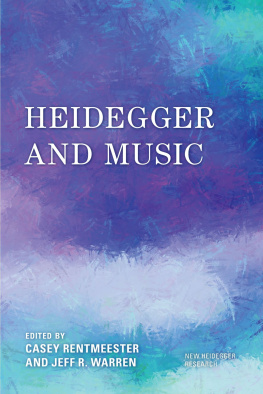

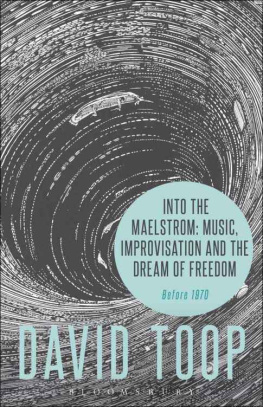
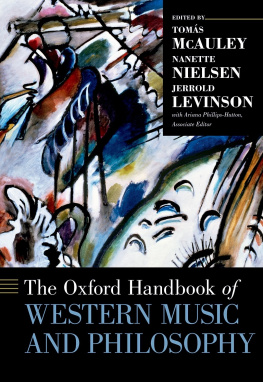
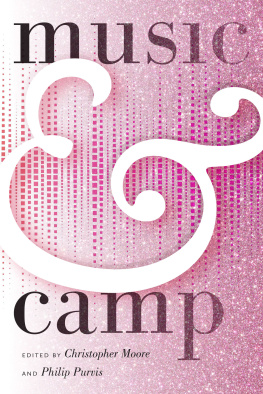
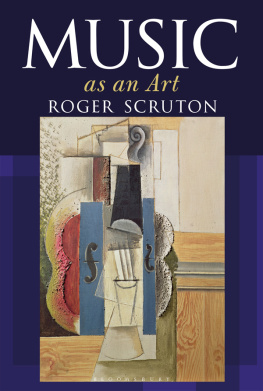
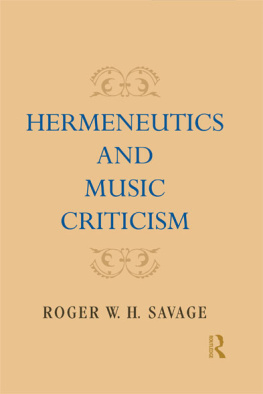
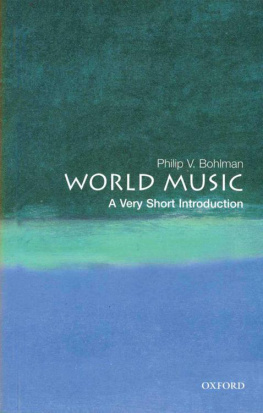
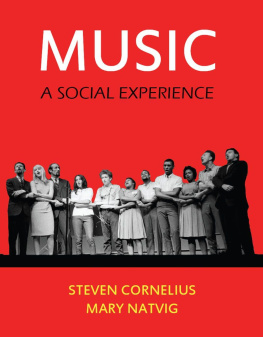

 The paper used in this publication meets the minimum requirements of American National Standard for Information SciencesPermanence of Paper for Printed Library Materials, ANSI/NISO Z39.48-1992.
The paper used in this publication meets the minimum requirements of American National Standard for Information SciencesPermanence of Paper for Printed Library Materials, ANSI/NISO Z39.48-1992.